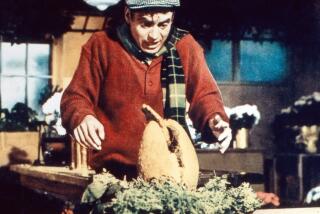Ralph E. Winters, 94; Film Editor Noted for ‘Ben-Hur’ Won 2 Oscars
- Share via
Ralph E. Winters, a two-time Academy Award-winning film editor whose nearly 70-year career began at the dawn of talkies and ended at the dawn of DVDs, has died. He was 94.
Winters, who received his best-editing Oscars for “King Solomon’s Mines” and “Ben-Hur,” died of natural causes Feb. 26 in Los Angeles.
In addition to his two wins, Winters received four other Academy Award nominations for best editing -- for “Kotch,” “The Great Race,” “Seven Brides for Seven Brothers” and “Quo Vadis?”
His more than 70 film credits also include “Gaslight,” “On the Town,” “High Society,” “Butterfield 8,” “The Hawaiians,” “How to Succeed in Business Without Really Trying,” “The Thomas Crown Affair,” “The Front Page” (1974 version) and “King Kong” (1976 version).
Winters also was a favorite of director Blake Edwards, for whom he edited 11 films, including “The Pink Panther,” “A Shot in the Dark,” “The Great Race,” “10,” “Victor/Victoria” and “S.O.B.”
“Ralph Winters was not only a talented and gifted professional, he was a kind, thoughtful and joyful friend to be with. I’ll miss him,” Edwards said Friday in a statement to The Times.
As an editor, Winters is probably best known for his work on “Ben-Hur,” director William Wyler’s 1959 Roman Empire-era epic, which received 11 Oscars.
It took Winters three months just to edit the film’s famous chariot race between Charlton Heston’s Ben-Hur and Stephen Boyd’s Messala.
“It’s probably the most famous action scene ever put together,” said Frank J. Urioste, senior vice president of feature development at Warner Bros. Pictures who was a film editor on such movies as “Basic Instinct” and “Total Recall.”
“I think he was the best at his craft,” said Urioste, who first met Winters at MGM in the late 1950s and worked with him on three films in the 1970s.
“He used to tell me, ‘You can teach fundamentals [of editing], but the actual art of doing it is something you can’t teach.’ And that’s something Ralph had that was special.”
The son of a tailor, Winters was born in Toronto and lived in Montreal and Philadelphia before his family moved to California in 1918 when he was 9.
In 1928, Winters was hired as an assistant editor at MGM, where his father worked in the wardrobe department.
“I was lured by the excitement and romance of the picture business,” Taylor said in a 1995 interview with the Motion Picture Editors Guild Newsletter.
“There are no miracles in film,” Winters, who worked his way up from the MGM shorts department, said in the book “Selected Takes: Film Editors on Editing” by Vincent Lobrutto.
As an editor, Winters said, “You’re working with material you’ve been handed. There have been times that I have worked, strived and beaten my brains out, and sometimes I can’t make a sequence look good because it just isn’t there.”
Winters’ last editing credit was on “Cutthroat Island,” a 1995 action-adventure film.
He served as president of the Motion Picture Editors Guild from 1965 to 1966 and as governor representing the editors’ branch of the Academy of Motion Picture Arts and Sciences at various times between 1976 and 1990.
In 1951 he became a founding member of the American Cinema Editors, or ACE, the industry’s only honorary society of film editors.
He served on the organization’s board of directors for many years and was a four-time ACE Eddie Award nominee.
In 1991, he received the ACE Career Achievement Award.
His autobiography, “Some Cutting Remarks: Seventy Years a Film Editor,” was published in 2001.
Teddy, Winters’ wife of more than 40 years, died in 1985.
He is survived by his wife, Lulu; five daughters; 10 grandchildren; and four great-grandchildren. In lieu of flowers, donations may be made to the American Diabetes Assn.
More to Read
Only good movies
Get the Indie Focus newsletter, Mark Olsen's weekly guide to the world of cinema.
You may occasionally receive promotional content from the Los Angeles Times.










